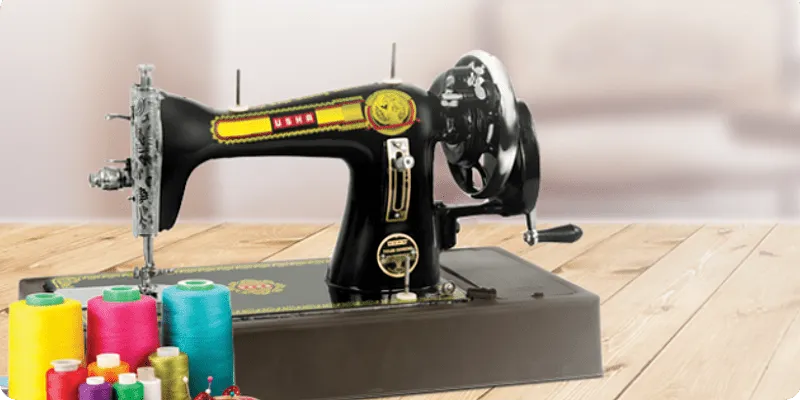How COVID-19 compelled Usha International to quit dependence on offline, explore ecommerce
Gurugram-headquartered consumer durables company, Usha International, was founded in 1935. In an exclusive interaction with SMBStory, the top officials of the company spoke about surviving the pandemic, strengthening digital presence, and more.
Usha International Limited has become a household name when it comes to consumer durables. So many of us have grown up sitting under its fans, seen our grandmothers stitching clothes using Usha’s black sewing machines, and our mothers have relied on its grinders to make tasty dishes.
The Gurugram-headquartered company was founded in 1935 by Lala Shriram. Over the years, it has been able to establish a strong offline presence. Moreover, COVID-19, which brought the entire world to a standstill, compelled the company to “quit its dependence” on offline channels and explore the online space deeper.
In an exclusive interaction, SMBStory spoke to Parveen Kumarr Sahni, President, Sewing Machines Business; Rohit Mathur, President of Electric Fans, Water Heater and Pumps; and Saurabh Baishakhia, President of Appliances at .
Among other things, the officials also spoke about surviving the pandemic, strengthening the company’s digital presence, and more.
SMBStory [SMBS]: What are some of the changes you have observed in customer behaviour in the wake of COVID-19?
Rohit Mathur [RM]: The needs of customers have changed drastically for various products. In terms of fans, we saw that people were unable to travel so they moved to online shopping. Even when people were purchasing offline, they would do a lot of research because many of the products are already listed online.
Parveen Sahni [PS]: For many years, sewing machines were used in business but during the pandemic, we saw them replace gadgets. Parents who were concerned about their children spending too much time in front of screens brought sewing machines to keep their children busy by encouraging them to learn to stitch.
Saurabh Baishakhia [SB]: The COVID-19 pandemic brought about several unpredictable changes and made us quit our dependence on offline channels. People were mostly at home and that is why ecommerce platforms prospered. Furthermore, we saw a rise in the demand for need-based functional kitchen appliances, which not only make cooking easier but also enhance the overall experience.

Image: Usha International
SMBS: Last year, many SMBs shut shop because of the lockdown. How did individuals in the tailoring and stitching businesses cope with the situation?
PS: We observed two trends. The first was people taking the digital and innovation route. For years, the traditional, black sewing machines were mostly sold out but gradually, people have shifted to more tech-enabled versions, for example, our WiFi-enabled sewing machines.
Moreover, many factories shut down and the unemployment rate went up. This resulted in a lot of women (such as wives of factory workers) buying sewing machines to earn some extra bucks for the family. This was especially true for workers in rural areas.
Additionally, the demand for stitching machines was also up because there was a significant need for manufacturing masks and PPE kits.
SMBS: The second wave struck at a time when the demand for fans generally goes up (March and April). Did the clash put any pressure on the business?
RM: When you look at how demand has panned out over the last few decades, there has been a shift in the consumer market. Today, the demand is need-based and the other is the demand to beautify homes. Over the years, we have focused a lot on launching fans that help people beautify their homes. So, we have both seasonal and non-seasonal products.
During the first wave, people were conserving money for, perhaps, a bad day and the second wave peaked during the summer months. This did put pressure on the business but the demand is rising now. I see India as a consumption-based economy so I believe things are getting back on track.

SMBS: For Usha, the south Indian market is going to be a priority in the coming months. How do you plan to strengthen your presence?
SB: We have a philosophy of “nailing it before scaling it”. So, while we dominate the northern, eastern, and western parts of the country, we realised that the southern market is much bigger and we need to do something special to increase our relevance there.
We have researched their market and launched a series of products such as rice cookers, wet grinders, etc. Since the southern market has a different preference when it comes to colours, we made sure we roll out these products in various colours. We also onboarded actor Keerthy Suresh as our brand ambassador. So, we are investing a lot in brand building and understanding the nuances of markets in Andhra Pradesh, Kerala, Karnataka, and Tamil Nadu.
SMBS: How has the D2C model occupied a larger part in the company’s overall strategy?
RM: This change is here for good and we see it in the long term. One of our strategies is to promote a few products online more because we can sell them there as compared to the offline spaces.
SB: Ecommerce has given us a very good reach. We have been able to make ourselves available in more pin codes because of our online presence. Demand from Tier-II and III cities has shown higher growth during the pandemic as compared to urban areas.
PS: We have evolved our services model significantly. We have made efforts to help customers understand how they can use the sewing machines or address challenges they are facing after buying online. We have shifted to interacting with customers on WhatsApp, rather than calls or physically meeting them.
We have also made a lot of content in terms of videos, which help the customers better understand the functioning of the machines.
SMBS: Going forward, what are your plans for the next 12-18 months?
PS: Our focus will be on four Es – educating customers by producing more content about our products, enhancing the buying experience of the customers, creating greater customer engagement through our digital marketing, and finally, generating employment by encouraging individuals to buy the sewing machines.
SB: Our focus will be on improving our reach in the urban market as well as the digital space. We are also looking at building strong product leadership. We also want to build products that have a strong functional and cognitive appeal.
RM: Going forward, we want to focus on launching energy-efficient and tech-enabled fans, as well as strengthen our online presence.
YourStory’s flagship startup-tech and leadership conference will return virtually for its 13th edition on October 25-30, 2021. Sign up for updates on TechSparks or to express your interest in partnerships and speaker opportunities here.
For more on TechSparks 2021, click here.
Edited by Kanishk Singh









